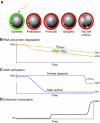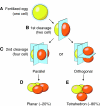Maternal control of early mouse development
- PMID: 20179092
- PMCID: PMC2834456
- DOI: 10.1242/dev.039487
Maternal control of early mouse development
Abstract
The hiatus between oocyte and embryonic gene transcription dictates a role for stored maternal factors in early mammalian development. Encoded by maternal-effect genes, these factors accumulate during oogenesis and enable the activation of the embryonic genome, the subsequent cleavage stages of embryogenesis and the initial establishment of embryonic cell lineages. Recent studies in mice have yielded new findings on the role of maternally provided proteins and multi-component complexes in preimplantation development. Nevertheless, significant gaps remain in our mechanistic understanding of the networks that regulate early mammalian embryogenesis, which provide an impetus and opportunities for future investigations.
Figures





References
-
- Adenot P. G., Mercier Y., Renard J. P., Thompson E. M. (1997). Differential H4 acetylation of paternal and maternal chromatin precedes DNA replication and differential transcriptional activity in pronuclei of 1-cell mouse embryos. aDevelopment 124, 4615-4625 - PubMed
-
- Alizadeh Z., Kageyama S., Aoki F. (2005). Degradation of maternal mRNA in mouse embryos: selective degradation of specific mRNAs after fertilization. Mol. Reprod. Dev. 72, 281-290 - PubMed
-
- Barton S. C., Surani M. A., Norris M. L. (1984). Role of paternal and maternal genomes in mouse development. Nature 311, 374-376 - PubMed
-
- Berryman M., Franck Z., Bretscher A. (1993). Ezrin is concentrated in the apical microvilli of a wide variety of epithelial cells whereas moesin is found primarily in endothelial cells. J. Cell Sci. 105, 1025-1043 - PubMed
Publication types
MeSH terms
Substances
Grants and funding
LinkOut - more resources
Full Text Sources
Other Literature Sources

